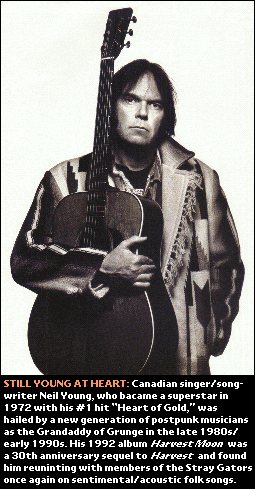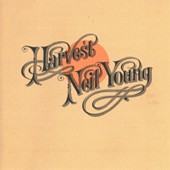|
Neil Young Reprise 1065 Mar. 1972 Billboard: #1
One of pop music's most acclaimed and enigmatic performers, Neil Young (born November 12, 1945, in Toronto, Canada) played in several rock bands while still in high school in Winnipeg. He returned to Toronto in the '60s, where he met Stephen Stills and Richie Furay. With Rick James ("Super Freak," "Give It to Me Baby"), Young formed a band called the Mynah Birds. When they split up, Young headed for California with the group's bassist, Bruce Palmer. Reunited with Stills and Furay in Los Angeles, they organized Buffalo Springfield, a west coast band (also including drummer Dewey Martin) that successfully blended the best elements of folk, rock and country. With the Springfield, Young showed himself to be a singer/songwriter of considerable prowess, contributing such memorable tunes as "Broken Arrow," "Mr. Soul" and "I Am a Child." One of the keys to the band's success was having five strongly-willed individuals -- which also led to its demise. After charting with singles like "Woodstock" (number 11) and "Teach Your Children" (number 16), the quartet broke up in 1971. Young once again embarked on an unpredictable career as a single artist, often backed by Crazy Horse. Young's first three solo albums provided FM radio with some of the early '70s' most unforgettable anthems of love, innocence and alienation -- "The Loner," "Sugar Mountain," "Cinnamon Girl" and "Everybody Knows This Is Nowhere." Young once described his music as being about "the frustrations of not being able to attain what you want." "Heart of Gold," culled from his fourth solo album, Harvest, is a perfect expression of the brooding, idiosyncratic artist at the height of his quest. "I was in and out of hospitals the two years between After the Gold Rush (his third LP) and Harvest," Young told Rolling Stone in 1975. "I have one weak side and all the muscles slipped on me... I recorded most of Harvest in a brace. That's a lot of the reason it's such a mellow album. I couldn't physically play the electric guitar." Recorded in 1971 in Nashville, "Heart of Gold" featured back-up vocals by Linda Ronstadt and James Taylor. A reflection of those unsettled times, the single entered the Billboard Hot 100 at number 62 on February 5, 1972. Six weeks later it was number one. Not that Young, whom critic John Rockwell once called "the quintessential hippie-cowboy loner," exactly felt at home in such a lofty position. As he put it in his notes for his 1977 retrospective LP Decade, "This song put me in the middle of the road. Traveling there soon became a bore so I headed for the ditch. A rougher ride but I saw more interesting people there." Actually, "Heart of Gold" was never intended for single release. "We went into the studio to cut the album," Young told Ray Coleman of Melody Maker, "and I guess we were hot that night and it was a good cut but it's gone now. I've seen a few artists who've got hung up on the singles market when they've really been albums people... It's easy to do, but if you're wise, you stay with being what you really are... I just hope there is not a single off my next album." With typical irony, he once told Rolling Stone, "One day Neil Young will write a happy song. But I'll probably sell it to TV for a commercial." - Fred Bronson, The Billboard Book of Number One Hits, Billboard, 1988.
No comments so far, be the first to comment. |


